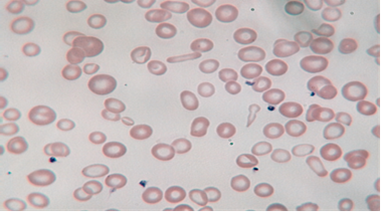A 66-year-old Caucasian man gives a history of increasing tiredness and lethargy over the preceding 2–4 months. He has recently lost his wife and has been drinking more alcohol than usual. His appetite is poor and he has lost 1 stone weight over the past 3 months. He eats a mixed diet. His bowels are regular and he does not report any blood loss. He is not on any medication. He has not had any illnesses in the past.
On examination, he is pale but not jaundiced. His blood pressure is 135/80 mmHg. Abdominal examination is normal but rectal examination is deemed unnecessary and there are no other abnormalities.
His FBC shows:
Haemoglobin (Hb) 76 g/L
Mean cell volume (MCV) 68 fl
Mean cell haemoglobin (MCH) 26
White blood cells (WBC) 8.6 × 109/L
Platelets 490 × 109/L
Erythrocyte sedimentation rate (ESR) 83 mm/h
Blood film – as illustrated.

-
(a) What is the differential diagnosis?
Show Answer
Correct answer: A history of anorexia and weight loss suggests occult malignancy. A microcytic anaemia suggests iron deficiency, and the elevated platelet count suggests bleeding as the cause. The raised ESR supports a diagnosis of underlying malignancy.
-
(b) Do you consider the clinical examination to have been adequate?
Show Answer
Correct answer: No. A rectal examination should be performed in all such cases as rectal carcinoma can present in this fashion.
-
(c) What blood tests would you do?
Show Answer
Correct answer: Further diagnostic tests should include serum ferritin, serum B12 and serum folate. Urea and electrolytes and liver function tests should also be done. His serum ferritin was found to be low, confirming iron deficiency. His B12 and folate levels were normal.
-
(d) His alcohol consumption is greater than usual – how relevant is this?
Show Answer
Correct answer: An accurate dietary and alcohol history should be taken, although alcohol usually causes a macrocytic anaemia.
-
(e) He has been bereaved and his diet may be worse than normal – how relevant is this?
Show Answer
Correct answer: A detailed dietary history is important – is he vegetarian? Does he cook himself? Does he eat fresh fruit? It is very unusual for iron deficiency to occur as a result of a poor diet, particularly in individuals who are not vegetarian. A poor diet may also cause folate or B12 deficiency, which would also cause a macrocytic anaemia.
-
(f) How would you manage him?
Show Answer
Correct answer: A search for a cause of bleeding is mandatory, even though physical examination does not offer clues to the source of blood loss. Once iron deficiency is confirmed, endoscopic and/or radiological investigation of the gastrointestinal tract is indicated. Upper gastrointestinal endoscopy revealed a malignant gastric ulcer which was successfully resected.

